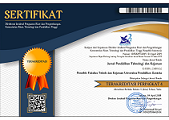VOCATIONAL SCHOOL STUDENTS' PERCEPTIONS OF GOOGLE CLASSROOM IN FULL ONLINE LEARNING AT THE BEGINNING OF THE COVID-19 PANDEMIC
DOI:
https://doi.org/10.23887/jptkundiksha.v19i2.47917Abstract
The global Covid-19 pandemic affects all aspects of life, including students learning process. Teachers and students were instructed to "study from home" using the online learning mode. Many online learning platforms were used during this time, including Google Classroom. The present study aimed to reveal students' perceptions of the implementation of Google Classroom at the beginning of the pandemic. The study took place in one of the state vocational schools in Denpasar City, involving forty students in Grade IX. The data were collected using questionnaires and interviews. The study revealed that most students positively perceived the implementation of Google Classroom in their online learning, even though the sudden shift to online learning. However, students viewed the implementation of Google Classroom in online learning mode lacked interactions during the learning process, causing them to feel that they had no chance to confirm information or knowledge that they had learned. This finding implies that teachers must build interaction between teachers and students during the online learning process.
Downloads
Published
Issue
Section
License
Authors who publish with the JPTK agree to the following terms:- Authors retain copyright and grant the journal the right of first publication with the work simultaneously licensed under a Creative Commons Attribution License (CC BY-SA 4.0) that allows others to share the work with an acknowledgment of the work's authorship and initial publication in this journal
- Authors are able to enter into separate, additional contractual arrangements for the non-exclusive distribution of the journal's published version of the work (e.g., post it to an institutional repository or publish it in a book), with an acknowledgment of its initial publication in this journal.
- Authors are permitted and encouraged to post their work online (e.g., in institutional repositories or on their website) prior to and during the submission process, as it can lead to productive exchanges, as well as earlier and greater citation of published work. (See The Effect of Open Access)












